The chemical composition determines SCM440 steel hardness
SCM440 steel is a kind of steel with good hardness, in addition to corrosion resistance, good tensile strength. And the chemical composition determines SCM440 steel hardness?
1. Overview of SCM440 steel
SCM440 steel is a grade of steel according to JIS standards of Japan.
SCM440 steel is a high carbon steel, but thanks to the chromium - molybdenum component, it has the ability to withstand oxidative corrosion, good heat resistance, very good tensile strength, in salty environment, constantly changing temperature. . In addition, SCM440 steel has the following characteristics:
- Good resistance to deformation;
- Good cutting processing;
- Hardness uniformity of all sizes.
- After heat treatment I have hardness: 50 HRC - 55 HRC;
- Easily machined by EDM.
Thanks to the above-mentioned properties, SCM440 steel is quite popular in:
- Precision manufacturing, molding, mechanical industry;
- Making cold stamping dies, shaped rolling shafts, gears, wear-resistant parts;
- Details of high load, frequent abrasion and strong impact such as screws, bolts, shafts, gears, ...
- Also suitable for making steel to make plastic molds, electronic components.
2. Chemical composition of steel SCM440
|
Tiêu chuẩn |
Mác thép |
Cacbon |
Silic |
Mangan |
Photpho |
Lưu huỳnh |
Crom |
Molipden |
|
JIS G4105 |
SCM440 |
0,28 - 0,43 |
0,15 - 0,35 |
0,6 – 0,85 |
0,03 |
0,03 |
0,9 - 1,2 |
0,15 - 0,3 |
Each chemical component in SCM440 steel has a certain role to create many outstanding features such as: good deformation resistance, good cutting processing and uniform hardness of all sizes of steel.
- Carbon (C) is the most important element, deciding mainly on the organization and properties of steel. The change in carbon content affecting the mechanical properties of steel includes strength, hardness, elongation, relative tightness and impact toughness.
- Chromium (Cr) is a highly reactive element. Thanks to chromium, stainless steel withstands the common oxidation and oxidation effects that occur on steel. The higher the chromium level, the higher the anti-rust level.
- Molybdenum (Mo) increases local pore wear resistance and better cracks wear resistance, and chloride resistance.
- Silicon (Si) increases the durability and hardness of steel but is not too obvious.
- Like silicon, Manganese (Mn) also increases the strength and hardness of steel but is not too obvious. In addition, Mn has the effect of mitigating the harmful effects of sulfur.
The chemical composition determines SCM440 steel hardness
3. The chemical composition determines SCM440 steel hardness
- Carbon is the chemical component that determines the hardness, not only of SCM440 steel in particular, but also the hardness of steel in general.
- Carbon in steel determines the hardness, limiting the movement of other elements in the crystal structure under the impact of many different causes. At the same time, carbon reduces greatly the ductility and impact toughness.
- The different number of elements and their proportions in steel aims to control quality objectives such as hardness, elasticity, ductility, and tensile strength.
- Steel with a high carbon content can increase hardness and tensile strength compared to iron, but it is more brittle and more likely to break.
- Carbon largely determines the use of steel. SCM440 steel has medium carbon content (0.3% - 0.5%) with high strength, stiffness, ductility and toughness although not the highest, having good quenching + tempering properties. Due to its high hardness, it is mainly used for machine parts subjected to high static loads and impact.
Hopefully the above information will solve the problems that readers are having. If you want more detailed advice on the type of industrial steel, readers can contact 0332 91 61 61 or chat online with us.
Sevit is pleased to answer all questions from readers!




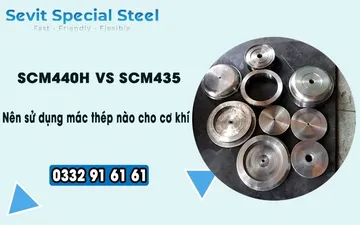

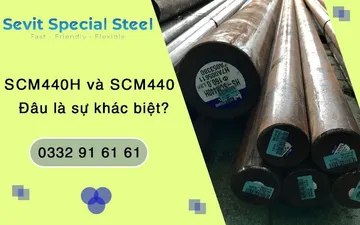

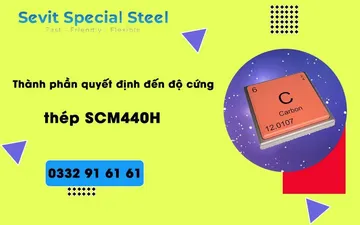
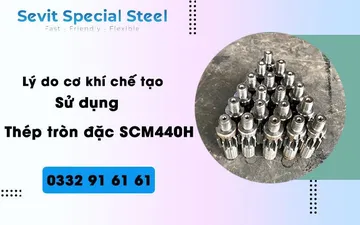
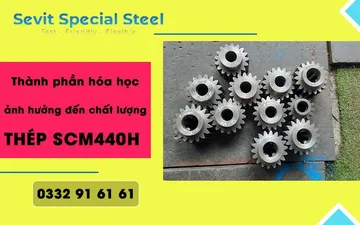
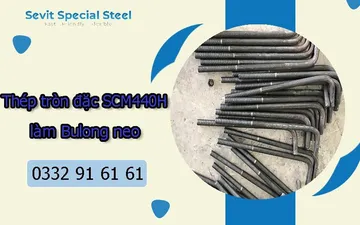

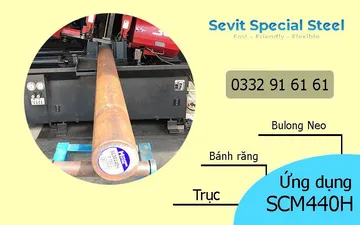

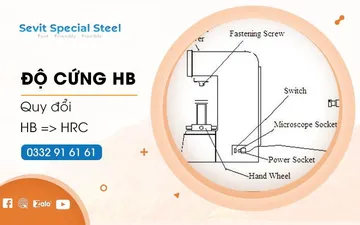
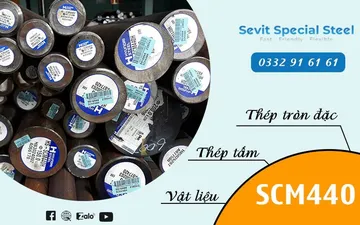
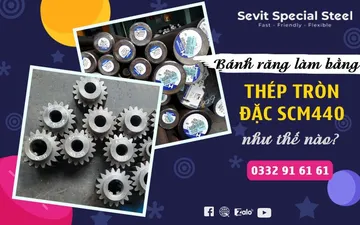






 Online
: 4
Online
: 4 Hits today
: 110
Hits today
: 110 Hits yesterday
: 129
Hits yesterday
: 129 Visits of the month
: 2972
Visits of the month
: 2972 Total access
: 951409
Total access
: 951409
